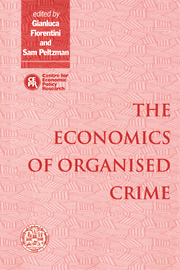Book contents
- Frontmatter
- Contents
- List of figures
- List of tables
- Foreword
- Acknowledgements
- List of conference participants
- 1 Introduction
- PART I THEORIES OF THE STATE AND THE ORIGIN OF CRIMINAL ORGANISATIONS
- PART II THE CRIMINAL ORGANISATION AS A FIRM
- PART III ORGANISED CRIME AND STATE INTERVENTION IN THE ECONOMY
- PART IV DETERRENCE POLICIES AGAINST LEGAL FIRMS INVOLVED IN ILLEGAL ACTIVITIES
- PART V DETERRENCE POLICIES AGAINST ORGANISED CRIME
- 10 Regulating the organised crime sector
- Discussion
- 11 Oligopolistic competition in illegal markets
- Discussion
- Index
10 - Regulating the organised crime sector
Published online by Cambridge University Press: 04 August 2010
- Frontmatter
- Contents
- List of figures
- List of tables
- Foreword
- Acknowledgements
- List of conference participants
- 1 Introduction
- PART I THEORIES OF THE STATE AND THE ORIGIN OF CRIMINAL ORGANISATIONS
- PART II THE CRIMINAL ORGANISATION AS A FIRM
- PART III ORGANISED CRIME AND STATE INTERVENTION IN THE ECONOMY
- PART IV DETERRENCE POLICIES AGAINST LEGAL FIRMS INVOLVED IN ILLEGAL ACTIVITIES
- PART V DETERRENCE POLICIES AGAINST ORGANISED CRIME
- 10 Regulating the organised crime sector
- Discussion
- 11 Oligopolistic competition in illegal markets
- Discussion
- Index
Summary
Introduction
The economic analysis of criminal activity, with the notable exceptions of Beccaria and Bentham, came to the attention of the economics profession in the late 1960s. Becker (1968) interpreted individual criminal behaviour as the solution to a portfolio choice problem and studied the normative question of the optimal punishments to be used to enforce a given legislation. In his own words, the main contribution of his work ‘is to demonstrate that optimal policies to combat illegal behavior are part of an optimal allocation of resources’. From this point of view the ‘economic framework becomes applicable to, and helps enrich, the analysis of illegal behavior’ (Becker, 1968, p. 209).
Motivated by the casual observation that the externalities imposed by the criminal sector are much larger when cooperation among individuals active in that sector increases its efficiency, Schelling (1967, 1971) turned attention to organised crime and to the issue of collusion of organisations dedicated to illegal activities.
Schelling (1967) raises the point that victimless activities, i.e. activities for which there is a demand, such as the sale of narcotics or arms and illegal gambling, generate enough profits for large-scale criminal organisations to come into being and to maintain themselves: ‘It may be … that without these important black markets, crime would be substantially decentralized, lacking the kind of organization that makes it enterprising, safe, and able to corrupt public officials. In economic development terms, these black markets may provide the central core (or ‘infrastructure’) of underworld business’ (Schelling, 1967, p. 177).
Schelling's argument becomes much more compelling when it is recognised that large-scale organisations may actually collude in these black markets so as to maximise total profit.
- Type
- Chapter
- Information
- The Economics of Organised Crime , pp. 253 - 268Publisher: Cambridge University PressPrint publication year: 1996



